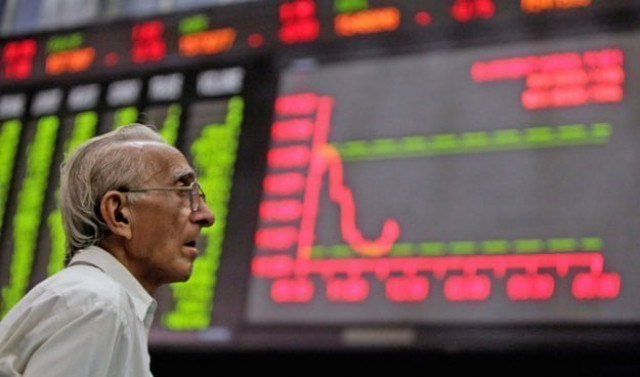Nearly Rs1.3tr wiped off PSX in Jul-Mar
Austerity measures, SBP’s double-digit policy rate hurt investors’ confidence

PHOTO: REUTERS

The outgoing fiscal year was a difficult one for the Pakistan Stock Exchange (PSX) as the deteriorating macroeconomic indicators kept investors wary.
The austerity measures and the SBP’s double-digit policy rate hurt the investors’ confidence in the first quarter (Jul-Sept) of FY2020, stated the Pakistan Economic Survey 2019-20.
After the initial dip, the KSE-100 index exhibited an upward trend as exchange rate stabilised and the economy was on a path of recovery, it said.
The index opened at 33,901.58 points on July 1, 2019 and reached the year’s peak at 43,218.67 points on January 13, 2020. However, progress was once again derailed as Covid-19 engulfed the world and capital began flowing out of stock markets across the globe.
Despite the double-digit policy rate, an upward trajectory was witnessed from mid-October to January, which could be attributed to the timely release of Public Sector Development Programme (PSDP) funds, a stable exchange rate and improvement in macro indicators (trade balance, foreign direct investment and remittances).
Between February 26 (the date when first Covid-19 case was reported in Pakistan) and March 31, the KSE-100 index benchmark dived 23.75% and Rs1,582.06 billion were wiped off market capitalisation. The rupee depreciated 8% against a strengthened dollar between during the period which severely constrained the spending power.
“Low turnover in the first quarter of FY20 and in February indicates investors were unwilling to put their money at risk by acquiring shares of a company with low share turnover.”
During July-March FY2019-20, a total of Rs1,266.36 billion were wiped off market capitalisation at the PSX.
However, in late March, the government announced a fiscal stimulus package of Rs1.24 trillion and the State Bank of Pakistan cut the policy rate by 425 basis points to 9% to make up for the projected loss, following this the stock market managed to recover some ground.
Market watch
Pre-budget optimism continued to have a positive impact on the Pakistan Stock Exchange on Thursday as the KSE-100 index extended gains by 63 points in a range bound session.
Owing to mixed investor sentiment before the budget announcement, scheduled for Friday, and with the unveiling of Economic Survey 2019-20, the market traded in both directions where some investors resorted to profit-booking while others cherry-picked stocks. Oil sector stocks came under selling pressure following a dip in global crude oil prices.
Earlier, stock trading kicked off with a spike and the index climbed in initial hours, however, selling pressure emerged later and wiped out the gains by noon. The index managed to climb in the second half again with investors making fresh investment due to positivity over the budget for 2020-21.
At close, the benchmark KSE-100 index recorded an increase of 63.50 points, or 0.18%, to settle at 35,128.58.
JS Global analyst Danish Ladhani said, “The market remained positive but some profit-taking was noted following a pre-budget rally.”
He added, “Fertiliser stocks were the major performers whereas financial and exploration and production stocks were the major laggards.”
“Going forward, we expect the market to remain range bound and recommend investors to sell on strength ahead of budget announcement,” the analyst said. Overall, trading volumes increased to 270.6 million shares compared with Wednesday’s tally of 218.7 million. The value of shares traded during the day was Rs8.67 billion.
Foreign institutional investors were net sellers of Rs281.3 million worth of shares during the trading session, according to data compiled by the National Clearing Company of Pakistan.
Published in The Express Tribune, June 12th, 2020.
Like Business on Facebook, follow @TribuneBiz on Twitter to stay informed and join in the conversation.


















COMMENTS
Comments are moderated and generally will be posted if they are on-topic and not abusive.
For more information, please see our Comments FAQ